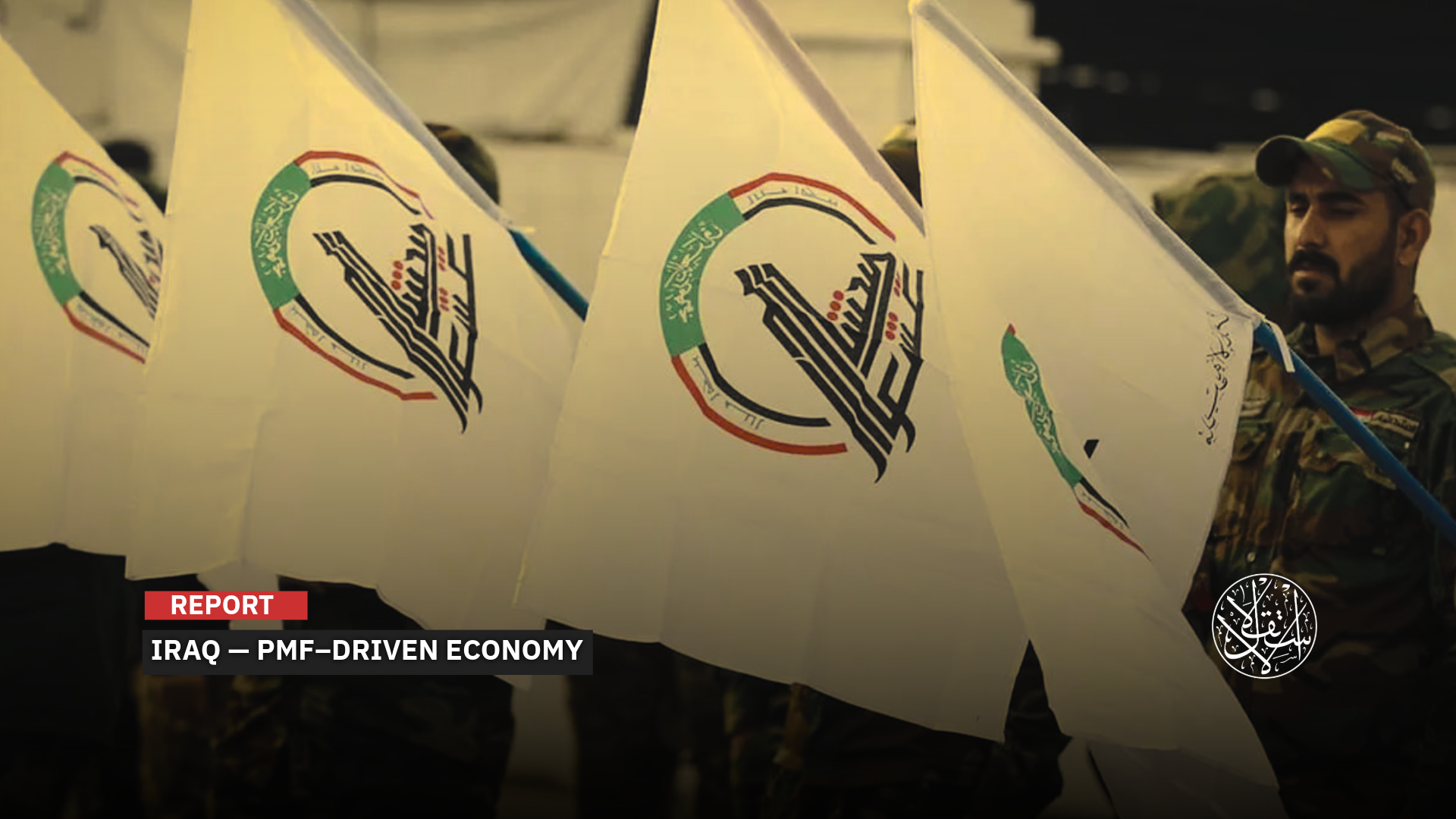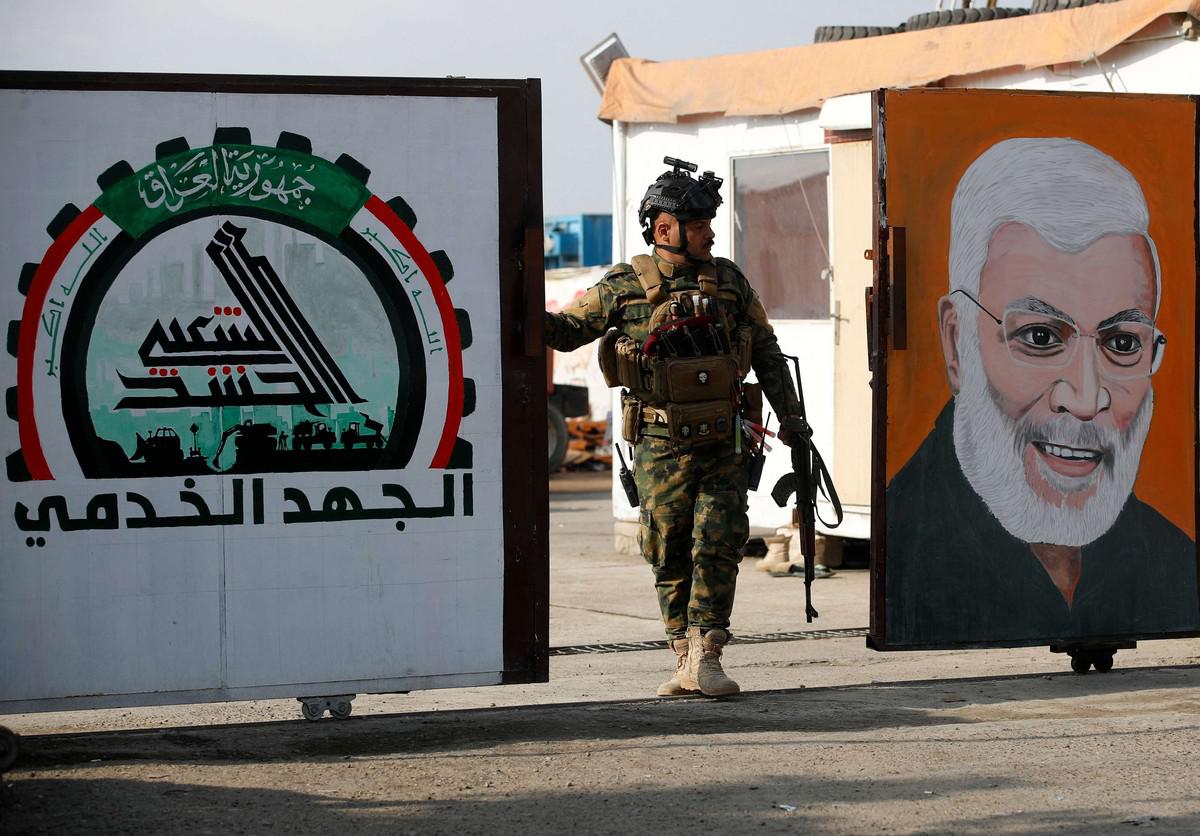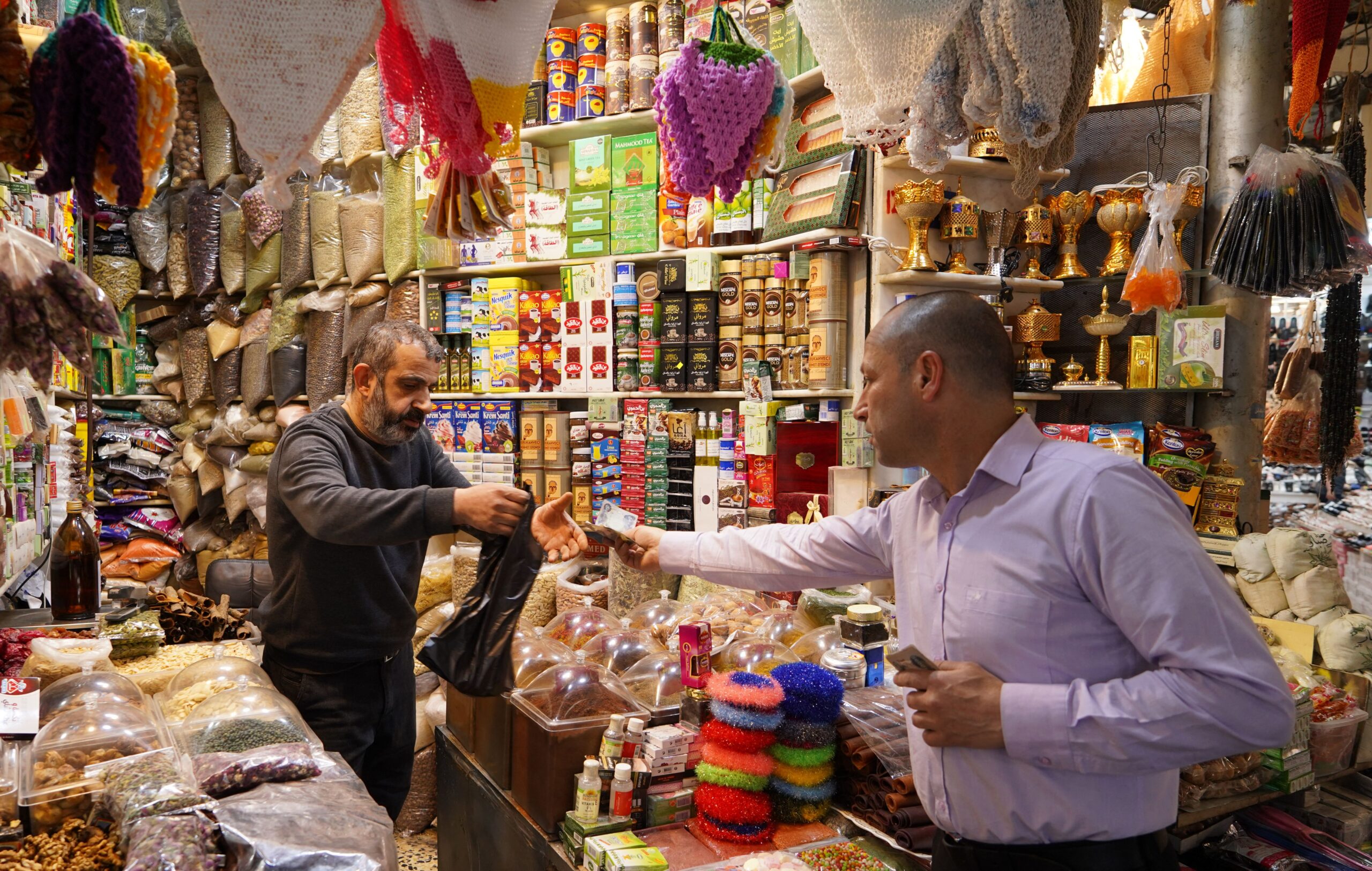Exploiting the Lull: How the Popular Mobilization Forces Are Spreading Through Iraq’s Economy

The cabinet approved the establishment of a public contracting and trading company for the Popular Mobilization Forces.
Amid a severe shortage of local cash liquidity in Iraq, which authorities are scrambling to address, factions within the Popular Mobilization Forces are expanding their economic footprint in the domestic market, particularly in the food sector, despite a deep recession across much of the economy.
Shiite factions under the Popular Mobilization Forces have penetrated Iraq’s economic sphere, sparking genuine concern among major traders about losing their livelihoods to competitors backed by the power of arms. These weapons were meant for fighting on the frontlines, not for building economic empires with the knowledge of official authorities.
Cash Shortage
Iraqi authorities estimate that around 87 percent of the nation’s cash supply is kept out of circulation and hoarded in homes. This has created a serious strain on the local economy and delayed salary payments for state employees, contributing to stagnation across many sectors.
Mustafa al-Karawi, a member of the Parliamentary Finance Committee, attributed the liquidity shortage to “a lack of trust between citizens and banks, which has led people to store their money at home rather than deposit it, significantly impacting the available cash supply.”
Al-Karawi said the issue of developing the banking sector and merging banks has been raised repeatedly in parliament, with the main reason being the public’s lack of confidence in the banking system. He added that the problem stems from long standing weaknesses in electronic and accounting systems, prompting people to avoid dealing with banks and to withdraw their salaries in full as soon as they are deposited, leaving no balance behind.
He stressed that the public’s reluctance to deposit or save money in banks, which drives many to keep cash at home, has fueled economic stagnation and reduced the volume of liquidity circulating in the market.
A parliamentary source, speaking to Al-Estiklal on condition of anonymity, said the government has discussed with the Parliamentary Finance Committee the possibility of issuing a new currency to end the liquidity crisis if citizens refuse to shift to electronic payments, as a way to draw hoarded money into circulation.
The source said this option is financially costly and requires time to implement but remains on the table if the government fails to convince the public to release their stored cash and deposit it in local banks, a process that depends on building trust between citizens and financial institutions.
Prime Minister’s adviser Mudhhir Muhammad Salih previously confirmed that 95 trillion dinars out of a total 109 trillion are kept outside the banking system. He noted that the habit of storing money at home rather than depositing it in banks remains a major economic challenge in Iraq.
Salih said estimates indicate that about 87 percent of the total money supply, roughly 95 trillion dinars out of 109 trillion, is held outside the banking system, preventing a large portion of national wealth from playing an active role in the economy.
In January 2023, Iraq’s cabinet issued a package of decisions requiring both government institutions and the private sector to adopt electronic payment systems, with implementation set to begin in June 2023. However, this has done little to free up the vast sums of cash stored in Iraqi households.

Exploiting the Crisis
Amid a cash shortage that has fueled an economic slowdown, Shiite factions within the Popular Mobilization Forces are making deep inroads into Iraq’s economy through the food market, importing and selling staple goods such as rice, cooking oil, and other essential items.
These groups shifted their focus to the food sector after facing restrictions in real estate, following government measures to curb money laundering and U.S. sanctions against militia leaders. Those sanctions have discouraged them from purchasing property abroad, according to an Iraqi trader.
Abu Abdulrahman, a Baghdad food merchant, told Al-Estiklal that the Popular Mobilization Forces are behind the influx of large volumes of goods into the market, selling to wholesalers and retail outlets on credit worth billions of dinars. He said they are able to collect payments by force, unlike other traders.
“Many popular brands in the market, especially in food products, are actually fronts for armed groups. Their sales methods are unusual, letting sales reps offer billions of dinars on credit, which regular merchants simply cannot manage,” he said.
These factions, the merchant added, have vast sums to import goods and flood the market while granting large amounts of credit, then collecting debts within set periods. This strategy enables them to dominate the market, deepening the stagnation for other traders.
Abu Abdulrahman voiced concern that armed factions could seize control of the remaining liquidity driving the market economy, a process taking place with the tacit approval of authorities that have failed to restore public trust in local banks and draw household cash deposits back into the banking system.

Iraqi economist Ziad al-Hashimi said that the “economy of non-state weapons” destroys the state’s core, manipulates its laws and system, feeds off its resources, weakens its sovereignty, and damages its reputation.
“The economy of non-state weapons is an informal network led by armed groups operating outside the control of the state and the law. These groups rely on their military power to build an economic system that seizes the state’s resources and capabilities to generate financial returns and political, security, and economic influence,” he posted on X.
“This economy depends on violence, threats, killings, kidnappings, extortion, smuggling, money laundering, fraud, the seizure of financial assets, and all forms of illicit trade to generate revenue.”
The goal, he said, is to strengthen influence and power to compete with the state and the rule of law, ultimately weakening them.
Al-Hashimi argued that the negative effects of this economy can be summed up in the creation of a parallel market that competes with the state, drains its public resources, undermines its performance, restricts its activity, halts its development, destroys its investment climate, drives investors away from its markets, and funnels its wealth outside the economic cycle.
‘Militia-ization of the Economy’
Fears among traders and economists about armed factions tightening their grip on Iraq’s economy confirm earlier warnings from economic and political figures. Those concerns escalated after the Council of Ministers approved the establishment of a public company named “al-Muhandis” for contracting and general trade, affiliated with the Popular Mobilization Forces, in late November 2022.
The company takes its name from former PMF deputy chief Abu Mahdi al-Muhandis, who was killed alongside Iranian General Qassem Soleimani in a U.S. drone strike near Baghdad Airport on January 3, 2020.
Iraqi writer Omar al-Halbousi said in a December 7, 2022, article published by the Iraqi National Charter website that the “black economy” led by militias and backed by Iran in Iraq is expanding, eroding the national economy.
This black economy, according to the writer, has grown into a mafia-like empire that rules Iraq with stolen wealth and unchecked weapons, under the protection of a government committed to empowering militias in every state institution to maintain its hold on power and strengthen a deep state that has wreaked havoc in the country.
Al-Halbousi noted that founding al-Muhandis Company is a new step toward institutionalizing the Iranian Revolutionary Guard model through the PMF, positioning it as the dominant force in Iraq’s affairs, and embedding militias as a permanent feature of Iraqi political culture to sustain an environment of terrorism in society.
Iraqi political analyst Ghalib al-Shahbandar warned that creating al-Muhandis Company marks the beginning of turning the PMF into a profit-making enterprise, a move toward what he described as the “militia-ization” of the Iraqi economy. He suggested there appears to be a deliberate plan to achieve this, instead of using the significant capital to employ thousands of unemployed Iraqis.
In a televised interview on November 30, 2022, al-Shabandar said there is a plan for the PMF to penetrate state industries and seize state resources as part of an effort to “militia-ize” both the state and the economy. He argued that this money could instead be used to revive thousands of idle factories, which could provide jobs for the unemployed.
The analyst also warned against allocating large sums of money to the PMF in exchange for industrial projects, pointing out that the PMF already receives salaries from the state like the Iraqi army. “Why repeat Iran’s experience of putting the national economy in the hands of the Revolutionary Guard?” he asked.
According to the Ministry of Industry and Minerals, Iraq has a total of about 227 factories in the public sector, of which only 140 are currently operating. Before 2003, the industrial sector accounted for around 23 percent of the country’s gross domestic product.
Sources
- Government Adviser: 95 Trillion Dinars Kept Outside Banking System [Arabic]
- Iraqis Distrust Banks: Over 90% of Cash Supply Kept Outside the Banking System [Arabic]
- Al-Muhandis Company: The PMF’s Vessel to Devour Iraq’s Economy Following Iran’s Path [Arabic]
- 'Massive Waste': What’s Behind the Surge in Dollar Sales in Iraq? [Arabic]












